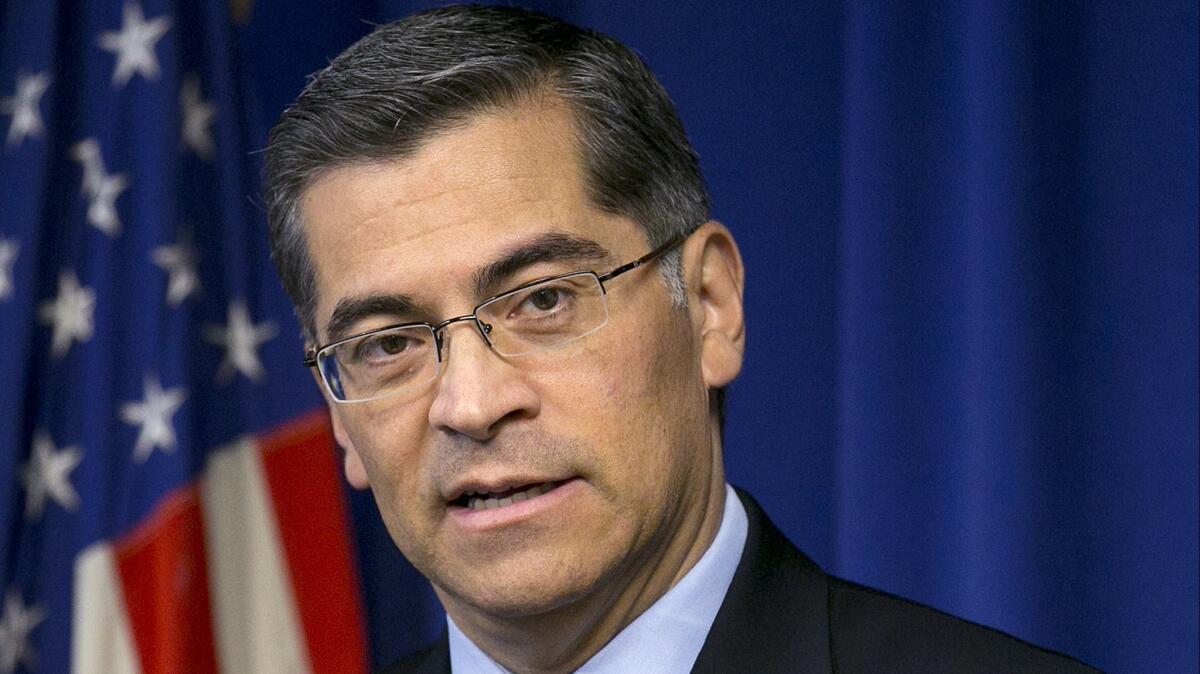California attorney general appeals judge’s decision to overturn physician-assisted suicide law

California Atty. Gen. Xavier Becerra on Monday filed an appeal against a judge’s recent ruling overturning the state’s physician-assisted suicide law.
The controversial law, which allows terminally ill patients to request lethal medications from their doctors, has been the subject of litigation since it was enacted two years ago.
Last week, Riverside County Superior Court Judge Daniel A. Ottolia ruled that the law’s passage was unconstitutional and the law should be overturned.
Becerra’s action Monday moves the case to an appeals court, which will decide the future of the law. He also asked that the law stay in place while the matter is further litigated, a request that will most likely be granted, said Kathryn Tucker, an attorney who heads the End of Life Liberty Project at UCSF/UC Hastings Consortium on Law, Science & Health Policy.
“I do not believe there will be a period of time in which the implementation of this statute will be interrupted,” Tucker said.
The state’s End of Life Option Act allows terminally ill patients with less than six months to live to request end-of-life drugs from their doctors, a practice that has been allowed in Oregon for more than 20 years. Now, nearly 1 in 5 Americans lives in a state where physician-assisted suicide is legal, according to advocacy group Compassion and Choices.
California’s legislation was passed in 2015 during a special legislative session dedicated to healthcare issues. Ottolia ruled that the state Legislature violated the state’s constitution by approving the law during the session, as it wasn’t a healthcare matter.
Becerra’s appeal called that ruling erroneous, citing the message Gov. Jerry Brown released when he signed the bill into law.
In the message, Brown said he was unsure what he would want if he were dying in prolonged and excruciating pain. But, he wrote, he imagined “it would be a comfort to be able to consider the options afforded by this bill. And I wouldn’t deny that right to others.”
“The enactment fell within the scope of the special session called, in part, to consider efforts to ‘improve the efficiency and efficacy of the health care system ... and improve the health of Californians,’ ” the appeal reads. “As the Governor indicated, the Act deals with pain, suffering, and the comfort of having the health care options afforded by the Act.”
Becerra also wrote that overturning the law immediately would leave healthcare practitioners facing possible criminal prosecution and terminally ill patients who qualify under the law left to “die an excruciating, painful death.”
The case will now be taken up in the 4th District Court of Appeal. If the court upholds the law, the plaintiffs could then ask the state Supreme Court to review the case.
The push for physician-assisted suicide in California came after Brittany Maynard, a 29-year-old Californian with brain cancer, moved to Oregon to take advantage of its end-of-life law.
In the first six months California’s law was in effect, more than 100 people made use of it to end their lives. Fifty-nine percent of them had cancer, according to state data.
Writing the lethal prescriptions is voluntary for doctors and medical facilities in California, and some, including all Catholic and church-affiliated hospitals, have not allowed their physicians to prescribe such medicines.
California’s data from the law’s first six months show that 173 physicians wrote the 191 prescriptions statewide.
soumya.karlamangla@latimes.com
Twitter: @skarlamangla
More to Read
Sign up for Essential California
The most important California stories and recommendations in your inbox every morning.
You may occasionally receive promotional content from the Los Angeles Times.











